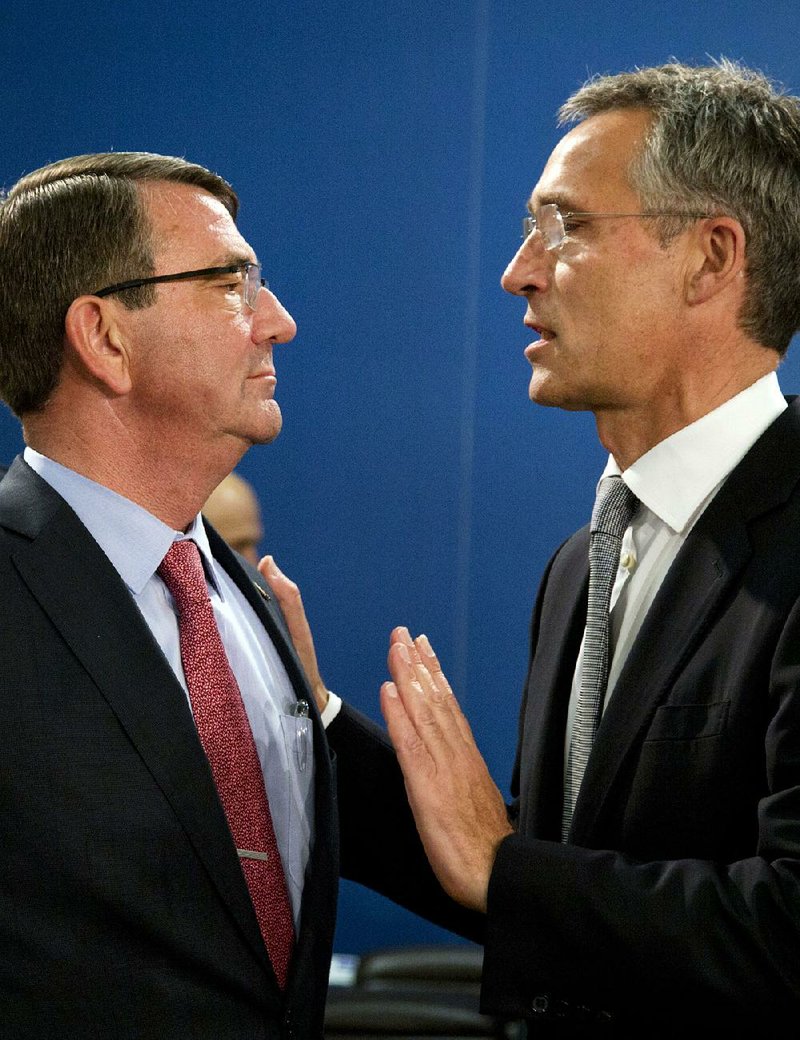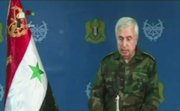DAMASCUS, Syria -- Syria's top general on Thursday said Russian strikes had helped government forces begin a "wide-ranging" offensive in central and northwestern Syria, where al-Qaida's affiliate as well as other insurgents had advanced toward key government strongholds in recent months.
Gen. Ali Ayoub said in a televised statement that the Russian strikes have facilitated an expanded military operation to eliminate "terrorists" -- a term the Syrian government uses to refer to all armed opposition to President Bashar Assad in the country's nearly 5-year-old civil war.
The Syrian ground push got a boost after Russian warships launched cruise missiles into Syria from the Caspian Sea on Wednesday. The strikes have alarmed the United States and its NATO allies, particularly Turkey, and on Thursday, the alliance signaled its readiness to defend Turkey if needed.
Russian officials say the 26 cruise missiles hit the provinces of Raqqa and Aleppo in the north and Idlib province in the northwest. The Islamic State has strongholds in Raqqa and Aleppo, while Syria's al-Qaida affiliate, the Nusra Front, has a strong presence in Idlib.
Russia says its intervention is aimed at helping the Syrian government defeat the Islamic State, but activists and U.S. officials say the strikes have targeted Western-backed rebels as well.
The Britain-based Syrian Observatory for Human Rights said Russian airstrikes in Idlib killed at least seven civilians Wednesday. At least 40 civilians were killed on the first day of the Russian airstrikes last week, according to activists and a human-rights group.
"After the Russian airstrikes, which reduced the fighting ability of Daesh and other terrorist groups, the Arab Syrian armed forces kept the military initiative," Ayoub said, using the Arabic acronym for the Islamic State.
"Today, the Syrian Arab armed forces began a wide-ranging attack with the aim of eliminating the terrorist groups and liberating the areas and towns that suffered from their scourge and crimes."
Syrian Deputy Foreign Minister Faisal Mekdad told state TV that the Western-backed Free Syrian Army, an umbrella group for dozens of local battalions, is no different from other militant groups.
"There is no difference between Nusra Front, Daesh and the Free Syrian Army -- if it still exists," he said. "They started [the armed opposition] and taught Daesh and Nusra all these crimes committed against Syria now."
The heavy fighting was concentrated in the rural areas of Idlib, Hama and Latakia provinces, where the Army of Conquest, a coalition of rebel groups that includes the Nusra Front, operates. The Free Syrian Army also has a presence in the area. The Islamic State has a limited presence in western Hama, away from where the clashes broke out.
Syrian TV showed footage of Syrian soldiers loading and firing artillery, as helicopters flew over rural Hama and Idlib. It also showed tanks and airstrikes. Syria State news agency SANA said joint Syrian-Russian airstrikes hit 27 targets belonging to the Nusra Front, including positions and training camps.
The Observatory and other activists said a military helicopter was downed in Kfar Nabouda, in northern Hama. A local media group said the helicopter belonged to the Syrian government. The Observatory, which relies on a network of activists across Syria, said Russian jets bombed areas near Kfar Nabouda.
The fighting is concentrated in an area adjacent to the heartland of Assad's family and the Alawite minority -- an offshoot of Shiite Islam -- to which it belongs.
Syria's conflict, which began as an uprising against Assad in March 2011 but escalated into a full-blown civil war after a government crackdown, has so far killed 250,000 people, according to figures from the United Nations.
The Violations Documentation Center, a Syrian rights group, said at least 43 civilians, including nine children and seven women, were killed in the first day of Russia's airstrikes in the central Homs province. The group, relying on witness testimonies and videos, said the strikes hit predominantly civilian areas in three villages and towns, including homes and a bread-distribution center. One airstrike hit a Western-backed rebel group based in northern Hama.
The group said it documented the dropping of at least two vacuum, or thermobaric, bombs, "which are entirely indiscriminate in nature and impossible to evade, even when taking shelter."
The group said the attacks constitute a "grave violation of international humanitarian law and, as a result, a war crime."
The Russian intervention is supported by an intelligence-sharing center set up in Baghdad to coordinate the efforts of Russia, Iraq, Iran and Syria. Mekdad said China is also assisting the Syrian government in fighting terrorism, but declined to elaborate.
Tension in Turkey
Russia's intervention has strained ties with NATO, particularly Turkey, which shares a long border with Syria and has been a leading backer of Syrian rebel groups. Turkey and its allies say the Russian strikes have mainly targeted moderate Syrian rebels.
Over the weekend, Turkey reported back-to-back violations of its airspace by Russian warplanes. Russia called its penetration of Turkish airspace a minor incident that was unintentional.
At a meeting of NATO defense ministers in Brussels that was overshadowed by concerns about Russia, Secretary-General Jens Stoltenberg signaled the alliance's readiness to deploy forces if needed to protect Turkey.
"NATO is able and ready to defend all allies, including Turkey, against any threat," Stoltenberg said.
He said NATO had already increased "our capacity, our ability, our preparedness to deploy forces, including to the south, including in Turkey, if needed."
However, pressed about what NATO precisely intended to do to aid Turkey, which shares a border with Syria, Stoltenberg told a news conference the mere existence of a beefed-up alliance response force, as well as a new and highly nimble brigade-size unit able to deploy within 48 hours, may suffice.
"We don't have to deploy the NATO Response Force or the spearhead force to deliver deterrence," Stoltenberg said. "The important thing is that any adversary of NATO will know that we are able to deploy."
The NATO meeting, attended by U.S. Defense Secretary Ashton Carter and counterparts from NATO's other 27 countries, was overshadowed by concerns about Russia's military actions in Syria.
NATO has stationed Patriot batteries in Turkey to protect it from missiles emanating from Syria, but those had been scheduled to be removed this year. NATO officials have been discussing whether to keep the batteries in Turkey, given Russia's actions, but Stoltenberg played down that possibility.
German Defense Minister Ursula von der Leyen said Russia must recognize that if it targets opposition groups in Syria that are fighting Islamic State, "Russia will strengthen IS, and this can be neither in the Russian interest, nor in our interest."
British Defense Secretary Michael Fallon accused Russia of making a serious situation "much more dangerous." Many NATO officials, including Stoltenberg, have expressed fears there could be an encounter, accidental or otherwise, between Russian planes and the air forces of the U.S.-led coalition attacking Islamic State in Syria.
Dutch Defense Minister Jeanine Hennis-Plasschaert said that in Syria, "Russia is not constructive, not reliable and not cooperative -- so it is of great concern."
Thursday's meeting, the ministers' first since June, implemented further changes in the alliance, in line with a blueprint ordered by President Barack Obama and other NATO leaders at the 2014 Wales summit, a process expected to last until the next summit in July in Warsaw.
A retooled NATO is supposed to be able to deal faster and more potently with an array of new security challenges, Putin's Russia and armed Islamic extremism in the Middle East and North Africa chief among them.
The new measures agreed upon Thursday include finalized plans, including command and control arrangements, for a NATO Response Force of up to 40,000 -- twice the current size -- and creation of new NATO headquarters offices in Hungary and Slovakia to enhance those Eastern European nations' defenses and speed reinforcement by their allies in the event of a real or perceived threat from Russia.
"We are implementing the biggest reinforcement of our collective defense since the end of the Cold War," Stoltenberg said before the meeting. Later, he said: "All of this sends a clear message to all NATO citizens. NATO will defend you; NATO is on the ground; NATO is ready."
In particular, the United Kingdom announced that it would send soldiers to the Baltic countries, Poland and Ukraine.
Dmitry Peskov, a spokesman for Russian President Vladimir Putin, told journalists Thursday that any increased presence of British troops in Eastern Europe would be regrettable, according to Agence France-Presse, adding that it would amount to the United Kingdom's using an alleged Russian threat as camouflage to press ahead with NATO expansion. Russia, he said, would respond with "parity."
In other news, U.S. officials said Thursday that as many as four of Russia's missiles missed their targets and landed in Iran.
The defense officials said it's unclear whether the errant missiles, launched from the Caspian Sea, caused any significant damage in Iran. Both the Russian government and state-run Iranian media accused the United States of inaccurate or deliberately deceptive statements.
Three U.S. officials said four missiles went off course. The officials were not authorized to discuss the matter publicly and spoke on condition of anonymity.
Iranian government officials could not immediately be reached for comment, but the semiofficial Fars news agency on Thursday said Western news reports about missiles going astray amounted to U.S. "psychological warfare" against Russia's intervention in Syria.
Secretary of State John Kerry spoke Thursday by telephone with Russian Foreign Minister Sergey Lavrov for about a half-hour, focusing primarily on Syria and Ukraine, State Department spokesman John Kirby told reporters.
Kerry voiced concern that the "preponderance of targets" being struck by Russian military forces in Syria aren't related to the Islamic State. Kerry told his counterpart that the U.S. was prepared to hold further discussions with Russia to avoid misunderstandings while both countries undertake missions in Syrian airspace, according to Kirby.
Kirby wouldn't discuss reports of Russian cruise missiles landing in Iran, but said such evidence would only reinforce the need for the U.S., Russia and others to "deconflict" their various military efforts in Syria.
Information for this article was contributed by Albert Aji, Sarah El Deeb, John-Thor Dahlburg, Lolita C. Baldor, Robert Burns, Bradley Klapper, James Heintz and Nasser Karimi of The Associated Press and by Helene Cooper and James Kanter of The New York Times.
A Section on 10/09/2015


